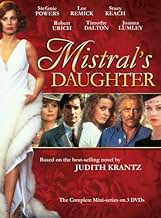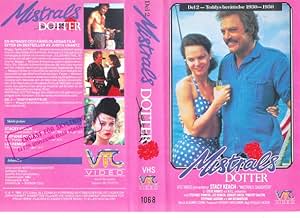PUNTUACIÓN EN IMDb
6,7/10
836
TU PUNTUACIÓN
La bella e ingenua Maggy Lunel llega a París completamente arruinada. Se convierte en modelo de artistas y en la estrella de París, atrayendo la atención del pintor Julien Mistral.La bella e ingenua Maggy Lunel llega a París completamente arruinada. Se convierte en modelo de artistas y en la estrella de París, atrayendo la atención del pintor Julien Mistral.La bella e ingenua Maggy Lunel llega a París completamente arruinada. Se convierte en modelo de artistas y en la estrella de París, atrayendo la atención del pintor Julien Mistral.
Explorar episodios
Argumento
¿Sabías que...?
- PifiasWhen Nadine visits her lawyer a reflection of the boom mic can clearly be seen in a picture as she enters his office.
- Versiones alternativasVersion currently shown on cable TV has been cut in half to 4 hours.
- ConexionesReferenced in Un sueño para ella (2003)
Reseña destacada
What can you say about this? Mistral's Daughter is probably the Gone With The Wind of juicy trash novel-into-miniseries of its era. Stuffed with familiar American actors who just barely pull off their roles as French free spirited artists and models (or, as in Stefanie Powers' case, don't), and nicely spiced with a fair number of British and Continental actors whose appearances chiefly go to prove how bad most American television performers are by comparison, the series has to coast primarily on lush locale filming and some very tony production values.
There are moments that render this gargantuan enterprise not completely without merit--Episode 5, in which we see Mistral's worst nature coming out in his collaboration with the occupying Nazis, which leads to the deaths of several people, and his abandoning of one of his closest associates, has some scenes that are able to evoke genuine emotion in the midst of all the surrounding soap opera; most of the credit for those can be handed easily to the very fine Ian Richardson, whose portrayal of Avigdor, the Jewish gallery owner/dealer who has given Mistral his first public artistic exposure and success (and who wins no gratitude from either Mistral or his scheming wife Kate as a result) is moving and first-rate. His performance carries far and away the most nuance and human believability of anyone in the cast--I'd have frankly been glad to see him given more screen time in trade for some of the purely wooden Robert Urich, for one example.
Stacy Keach tries as the Picasso-esque Mistral--I think what failings there are in his performance stem less from thespic inability on his part than from the basic silliness of Krantz's conception of what a 'narcissistic genius' artist might be like--she gets the high notes right, but obviously can't imagine anything beyond cartoon-level 'complexity' for Mistral's less flamboyantly selfish side (oddly enough, bad a writer as Krantz is, Mistral's Daughter is probably her best-written book, likely because of the affinity with the Jewish issues woven into the plot. These themes seemed to have caused her to tone down the trashiness somewhat, and to treat her material with slightly more respect than is normal for her style. However her take on 'artist's quarter Paris' is hilariously wrong, and the film, with its apparent inability to tone down the overtly contemporary look of most of the actors, particularly a number of the female ones, along with a goodly number of historical inaccuracies, just plays up the anachronistic feel to an annoying degree).
Timothy Dalton is good as Maggie's doomed great love, and initially at any rate, Lee Remick is quite credible as the smitten but always calculating Kate. Her character is turned into such an over-the-top wicked witch sort by the time of her exit however, that she comes off more like a stereotypical soap-queen evil matriarch than as anything recognizably human. Powers can work up the occasional pretty pout in her earlier scenes, but she ain't credible as either 18-year-old nymph or as post-menarche grande dame, and her histrionics in the years between don't add up to much more than a set of nicely photographic cheekbones and some sweetly glycerine tears here and there.
But there are a few bits that make this a not totally worthless jaunt-- a firm grip on the fast-forward button might be advisable--and the penultimate scenes which show Mistral's artistic expiation for his wartime sins do carry some honest emotional heft (though I could wish they'd have come up with better paintings than the ones used to illustrate this), and there is the allure, no matter how silly, of the multi-generational epic device. Despite the main theme of the story dealing with great art and its primacy above all other considerations, don't expect too much high art from this production, and you might step away from it not totally unentertained.
There are moments that render this gargantuan enterprise not completely without merit--Episode 5, in which we see Mistral's worst nature coming out in his collaboration with the occupying Nazis, which leads to the deaths of several people, and his abandoning of one of his closest associates, has some scenes that are able to evoke genuine emotion in the midst of all the surrounding soap opera; most of the credit for those can be handed easily to the very fine Ian Richardson, whose portrayal of Avigdor, the Jewish gallery owner/dealer who has given Mistral his first public artistic exposure and success (and who wins no gratitude from either Mistral or his scheming wife Kate as a result) is moving and first-rate. His performance carries far and away the most nuance and human believability of anyone in the cast--I'd have frankly been glad to see him given more screen time in trade for some of the purely wooden Robert Urich, for one example.
Stacy Keach tries as the Picasso-esque Mistral--I think what failings there are in his performance stem less from thespic inability on his part than from the basic silliness of Krantz's conception of what a 'narcissistic genius' artist might be like--she gets the high notes right, but obviously can't imagine anything beyond cartoon-level 'complexity' for Mistral's less flamboyantly selfish side (oddly enough, bad a writer as Krantz is, Mistral's Daughter is probably her best-written book, likely because of the affinity with the Jewish issues woven into the plot. These themes seemed to have caused her to tone down the trashiness somewhat, and to treat her material with slightly more respect than is normal for her style. However her take on 'artist's quarter Paris' is hilariously wrong, and the film, with its apparent inability to tone down the overtly contemporary look of most of the actors, particularly a number of the female ones, along with a goodly number of historical inaccuracies, just plays up the anachronistic feel to an annoying degree).
Timothy Dalton is good as Maggie's doomed great love, and initially at any rate, Lee Remick is quite credible as the smitten but always calculating Kate. Her character is turned into such an over-the-top wicked witch sort by the time of her exit however, that she comes off more like a stereotypical soap-queen evil matriarch than as anything recognizably human. Powers can work up the occasional pretty pout in her earlier scenes, but she ain't credible as either 18-year-old nymph or as post-menarche grande dame, and her histrionics in the years between don't add up to much more than a set of nicely photographic cheekbones and some sweetly glycerine tears here and there.
But there are a few bits that make this a not totally worthless jaunt-- a firm grip on the fast-forward button might be advisable--and the penultimate scenes which show Mistral's artistic expiation for his wartime sins do carry some honest emotional heft (though I could wish they'd have come up with better paintings than the ones used to illustrate this), and there is the allure, no matter how silly, of the multi-generational epic device. Despite the main theme of the story dealing with great art and its primacy above all other considerations, don't expect too much high art from this production, and you might step away from it not totally unentertained.
- amyghost
- 21 abr 2015
- Enlace permanente
Selecciones populares
Inicia sesión para calificar y añadir a tu lista para recibir recomendaciones personalizadas
- How many seasons does Mistral's Daughter have?Con tecnología de Alexa
Detalles
Contribuir a esta página
Sugerir un cambio o añadir el contenido que falta

Principal laguna de datos
What is the English language plot outline for La hija de Mistral (1984)?
Responde




































